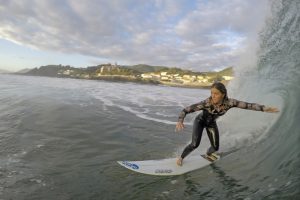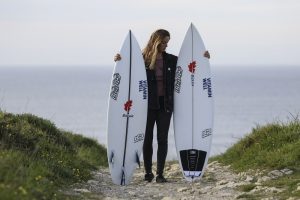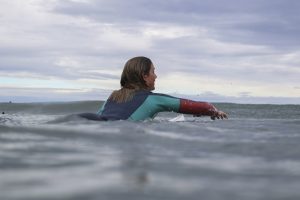Leticia Canales fights for a place in the Olympic Games, where surf is being included for the first time

The World Surf League’s Las Américas Pro Cabreiroá is in its second day of competition in Tenerife and among the more than 150 world-class surfers taking part, Leticia Canales is there. After her disappointing finish in the Corona Open China, the Basque surfer is prepared to match last year’s silver medal. “This is one of my favourite events in the world tour”, she says.
“My first tournament of the year went quite badly because of an error from the organisation.” In surf, athletes know their turn in line through a colour panel system and this failed in China, as two colours were shown at the same time.

After Tenerife, the WSL will fly to Australia and New Zealand, for the Sydney Surf Pro among others, lasting over a month. “We are honestly scared of the fires the country is suffering from”, Canales says.
Canales is a young Basque surfer competing in the World Surf League, an independent private surf league. Last year she finished 51st in the world and fourth in Europe, but wants to improve that mark this year, which coincides with the Olympic Games.
“My dream is to go to the Olympics and I can achieve that by finishing in the Top 7 in the last pre-Olympic tournament in El Salvador”, Canales says. El Salvador will be hosting the 2020 ISA World Surfing Games from May 9-17, which will determine the final 12 qualifiers for Tokyo 2020.
https://www.instagram.com/p/B7ZBozqIGvk/
Last season, the young surfer finished 15th and regrets not having shown all her skills. Due to surf becoming an Olympic sport for the first time this year, Canales was included in the Basque Team – an institution created by the Basque Government to give support to Basque athletes in their international tournaments. This entity is based outside Bilbao where Leticia stays and trains with her coach Jatyr Berasaluce, who is also a professional surfer.
Canales has been in the team for a year an in spite of living less than ten kilometres away from home, she cannot see her parents. “We have to train and stay focused, because we all have our sporting goals.” In terms of training, she practises both in and out of the sea. “Surfers are becoming proper athletes, so we have to compete as such”, she says.
But in spite of her success in the sport, Leti Canales also talks about the economic difficulties she encounters. “This year has been the first year I haven’t finished in the red,” Canales admits.
Surf is an expensive sport if you don’t rely on the help of sponsors. Leticia has the Basque Team grant for sporting achievements and her hometown’s town hall also gives her a monthly grant. But, she says, there is always uncertainty about the following year.

The WSL requires an initial payment of $200 plus an annual insurance policy costing of $1,000 as well as an inscription fee for every competition the surfers take part in. Every tournament has different points linked to it, so the 1,500 point ones cost $150, the 5,000 point ones cost $250, and the 10,000 point ones cost $350.
When surfers finish the current season, they have a month to decide which tournaments to attend the next: “You have to decide in terms of wave characteristics, ranking, etc. but there are always factors you can’t control,” Canales says. “For example, I want to take a quality leap and fight for a position in the Top 10.”
Up until this year, Canales travelled with five or six other women from the WSL tour and they divided the expenses. “It’s not only paying the competition fee, you also have to pay for the flight, surf boards, car, etc.” This year she can afford to pay for her coach’s flight and services.
Early surf life
Sopela, Leti Canales’ hometown, is a costal town outside Bilbao with surf as its trademark. She started with her father and older sister, competing at local tournaments where she was the only girl. After being selected for the national team at 14, she won her first medal in Portugal. “That is where I decided I wanted to become a professional surfer.”
“My parents have never allowed me to neglect my studies,” Canales says. “In fact, they never let me travel without studying and doing my homework, alongside my competitions.”
Canales agrees with athletes to being obliged to continue their studies, because their professional life will end at some point. She is studying Sport Sciences at university, but is thinking of changing to Physiotherapy.
Sports Gazette wishes Leticia Canales good luck in Tenerife and, shortly after, in Australia.
Competition update
Leticia Canales did not offer her best surfing skills in Las Américas, but finished third at the first Challenger Series -10,000 points- at Manly Beach in Australia. She competed against Carissa Moore, an American surfer and last year’s WSL champion., who later went on to win the tournament.